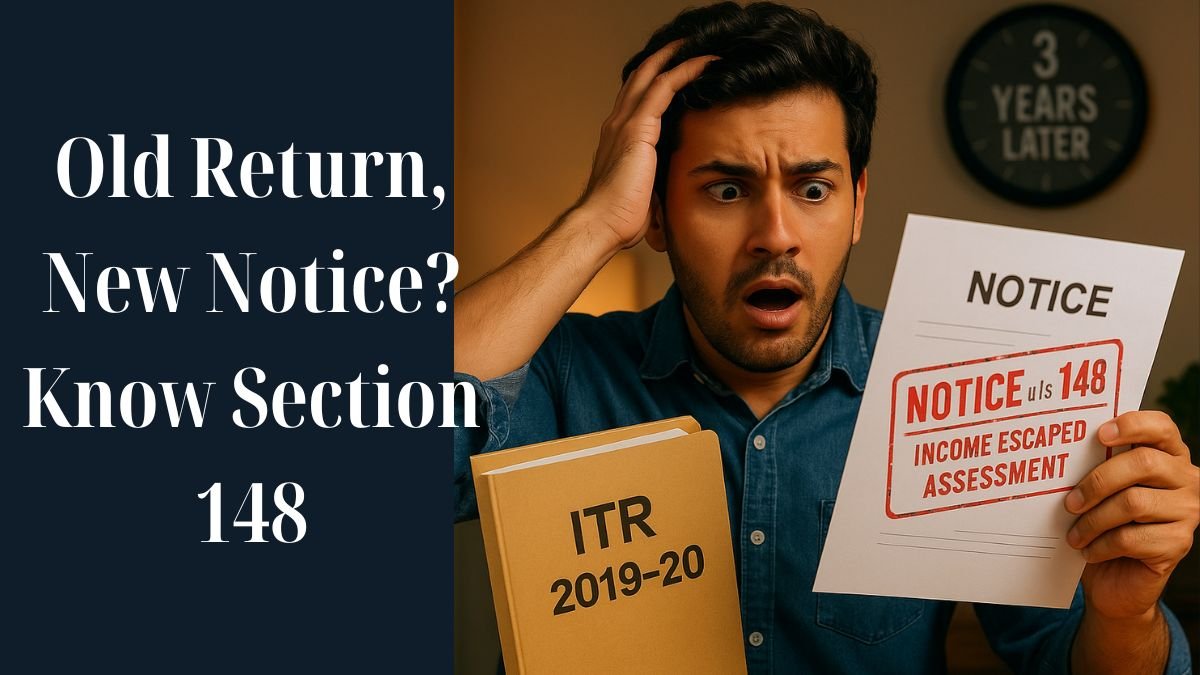
You’ve filed your Income Tax Return (ITR), and you think it’s all done and dusted. But then, an unexpected letter arrives. It’s a notice under Section 148 ofthe Income Tax Act. Sounds stressful? You’re not alone.
Many taxpayers receive such notices from the Income Tax Department, sometimes years after they’ve filed their returns. That’s where the power of income tax reassessment under Section 148 comes into play.
Let’s break it down so you understand what it means, what your rights are, and what you need to do if you receive a Section 148 income tax notice.
What Is Section 148 of the Income Tax Act?
Section 148 gives power to the Income Tax Department to reopen or reassess previously filed income tax returns if it believes some income has escaped assessment. It is governed by the broader framework under Section 147 of the Income Tax Act.
Essentially, if the Assessing Officer (AO) finds any discrepancy or has a reason to believe that you did not disclose full income, they can initiate reassessment under this provision.
In simple terms, Section 148 allows the IT Department to reassess an individual's previously filed ITR when there’s suspicion of under-reporting or omission of income.
Income Tax Reassessment Section 148: How It Works
Before issuing a notice under Section 148, the AO must follow the procedure laid out in Section 148A. This includes:
- Conducting a preliminary inquiry (if required)
- Allowing the assessee to be heard through a show-cause notice
- Considering the reply of the assessee
- Passing an order under Section 148A(d) with recorded reasons
Only then can the department issue a Section 148 income tax notice to begin the reassessment.
This procedure ensures that reassessment is not carried out arbitrarily and gives taxpayers a fair chance to respond.
Reasons for Receiving a Section 148 Income Tax Notice
You may receive a notice if:
- Large bank transactions were not reported in your ITR
- Property or stock investments seem inconsistent with declared income
- High-value cash deposits were found during demonetization
- Mismatch in TDS data and declared income
- Foreign income/assets not disclosed
In short, any tax calculation that has not been reassessed or appears suspicious will be reported by the tax department.
Time Limit for Issuing Notice under Section 148
The time limit for reassessment is governed by Section 148A of the Income Tax Act:
- Up to 3 years from the end of the relevant assessment year, the AO can issue a notice without needing special approval.
- In cases where income escaping assessment exceeds ₹50 lakh, the time limit can extend up to 10 years, but with prior approval and strong documentary evidence.
This makes it important to retain your financial documents for several years.
Key Provisions and Legal Backing
Here are some related keywords and legal terms often associated with reassessment:
- Section 148a(b) – Refers to the show-cause notice asking for taxpayer's response
- Section 148a(d) – Final decision on whether notice under 148 should be issued
- Penalty under Section 148 of the Income Tax Act – If income is found concealed, penalties may follow
- Supreme Court Judgement on Section 148 – Recent judgments have clarified that reassessment notices issued before following Section 148A can be deemed invalid
- Income Tax Act Section 148 PDF – Official document available on the Income Tax portal
- Section 148 of Income Tax Act 1961 – The foundational law behind reassessment
- Income tax notice Section 148A – The first step before Section 148 reassessment begins
What to Do If You Receive a Section 148 Notice
Here’s a simple guide:
- Don’t panic. A reassessment notice doesn’t mean you’re guilty.
- Read the notice carefully. Understand the assessment year and nature of income in question.
- Respond on time. You’ll be asked to respond to a show-cause notice under Section 148A(b).
- Submit the required documents. Provide bank statements, ITR acknowledgements, and any relevant proofs.
- Consult a CA or tax expert. Professional guidance can help draft appropriate replies and avoid penalties.
Failure to respond may lead to a best judgment assessment and penalty proceedings. "
Penalties and Consequences
If the reassessment leads to additional tax liability, you may be liable to:
- Pay interest on unpaid tax
- Pay a penalty for under-reporting income (50% to 200% of the tax evaded)
- Face prosecution in serious cases
That’s why it’s critical to respond to the Section 148 income tax notice professionally and promptly.
Recent Supreme Court Observations
The Supreme Court’s judgement on Section 148 of the Income Tax Act in 2022 clarified that all notices issued under the old regime (without following Section 148A) post-April 1, 2021, are invalid. This judgment strengthened taxpayer rights and forced the department to follow due process.
Final Thoughts
Section 148 of the Income Tax Act ensures that no taxable income escapes the eyes of the tax authorities. While this protects government revenue, the law also balances taxpayer rights through procedural fairness under Section 148A.
Let’s summarise:
- Income tax reassessment under Section 148 happens when income has escaped assessment
- Section 148A ensures a fair hearing before notice
- The IT Department has the power to reassess an individual’s previously filed ITR
- Any tax calculation not reassessed or found suspicious is notified "
- Time limits range from 3 to 10 years, depending on the amount involved
👉 Need help drafting a reply to your Section 148 notice or understanding reassessment?
Visit www.callmyca.com for expert legal support, timely filing, and peace of mind.











